
Subject to a lot of debate of late is the matter of SEO versus PPC. The two most powerful traffic generating approaches to reckon. SEO in short for search engine optimization. PPC in a nutshell for pay per click. Though for both their end goal is the same. They are still different concepts that need different techniques and methodologies. You need to decide which one to pick. To better your eCommerce store.
- Paid Search (SEM)
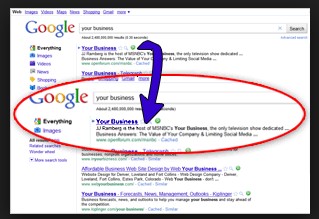
SEM revolves around investing advertising dollars in choosing the right keyword. When you want to appear in the paid search results on the main search engines. When you can’t make it to the top of organic search results. You can always buy your way into the sponsored links section of Google using Google AdWords.
Even though organic search results might lead to more clicks. To have some presence on the first page is still better than none at all. The benefit of paid search listings is that you can customize your look in search results. Other than your usual website’s title and description you use in organic results. You can use something that calls out to a particular sale in sponsored results.
Pay-per-click marketing is a way of advertising on search engine results pages. You bid to have your ads appear in the sponsored results. As and when someone types in a query including your keywords.
Pay-per-click ads are a super way to create immediate traffic and sales.
It’s named “pay per click” because you have to pay for every user who clicks on the ad you are promoting.
PPC's core strengths are its speed and reach. With a PPC campaign, you can be on the first page for many targeted terms within a day. The words can cost anywhere from pennies to many dollars per click. For a perfect PPC campaign, it's usually best to hire a firm that can manage it full time.
Paid advertising is an investment that you can enjoy real quick. Assuming you deploy effective campaigns.
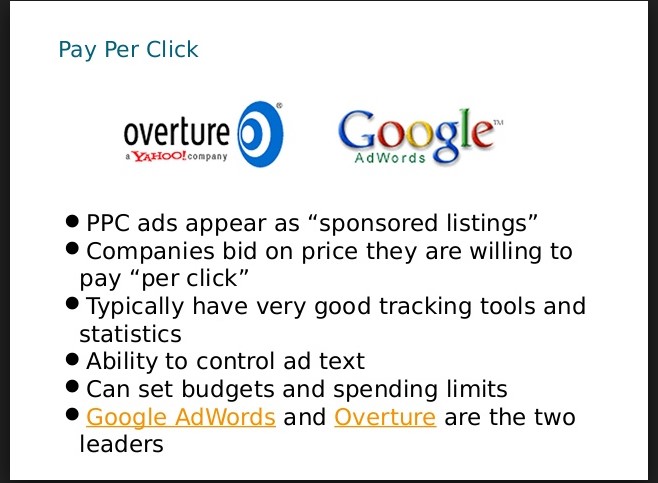
Prominent PPC systems include Google AdWords, Yahoo Advertising, and Facebook’s advertising platform. Niche-specific PPC systems also abound. A good example is PlentyOfFish.com’s advertisement option, working wonders with dating offers.
So, when should you use PPC marketing? Below are some circumstances when PPC proved beneficial for an online business.
• For Immediate results. PPC delivers results fast. Just count the minutes before a rush of visitors come cascading to your pages. The moment your PPC campaign gets approval. Your ads will immediately be on display for millions of people to see. The traffic will almost be instantaneous. Hence, PPC works well with product launches, squeeze pages, CPA marketing. It also includes affiliate marketing involving high converting offers. Alongwith Joint venture (JV) projects, seasonal promotions, event-focused marketing, and analogous online business campaigns.
• When you want high targeted traffic. PPC marketing allow you to narrow down your prospects. Based on their demographic data. Many PPC platforms, like social media sites. Will Enable you to promote to the age range, gender, income bracket, education level. Even marital status of the people who view your ad. Popular social media sites like Facebook allow you to target people as per their hobbies. All these make PPC a powerful way of reaching the narrow band of people your business needs. By leading them to your web pages.
• When promoting a time-sensitive offer. Marketing products, services or events with an end date is always a race against time. Often, the long gestation period of SEO campaigns would produce late results. For all these time-sensitive offers, the expedience of PPC marketing will be perfect. Promoting an offer that will end in 2 days? No issues. PPC will deliver the traffic you need in a matter of minutes.
• When you don’t design your website for SEO. SEO requires content rich sites that need regular update. It is the only way to 1) inform the search engines that your site is relevant. 2) Reminding the search engines to keep your site at the top of the pile. Some websites do not design for this. Squeeze pages, for example, don’t have the content to merit a second glance from Google. For websites such as this, you can generate traffic from PPC marketing.
• If you wish to dominate search results for your keyword category. PPC results are on display above the organic search results. The prominent position means that often, close to 50% of the search traffic go to the top 3 sponsored links. If you do not have PPCm presence, you're conceding loss of all those clicks to your competitors. If you want to maximize your click share of available searches. For keywords relevant to your business you sure must engage in PPC!
- Free Organic Marketing (SEO)
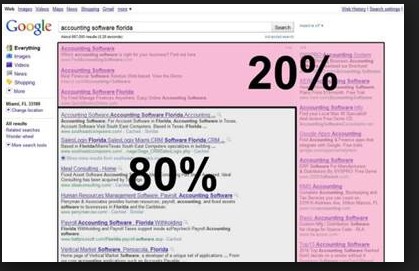
SEO refers to a classification of techniques. That aim to propel a particular website to the first page of the major search engines.
SEO is crucial for online businesses. Statistics show that 80% of the traffic generated for any internet site. Come from the search engines. The biggest search engine without any doubt is Google. It garners more than 400 million searches per day. Most SEO campaigns target this particular search engine.
Organizations of all size realize the importance of online marketing through search engines. Findings by Jupiter Research, a Forrester Research company. 81% of users find their desired goal through search engine. This research makes it clear. That it's critical that your brand has a strong presence in the search engines. Thereby ensuring that you're in front of your target audience. The article details. That organic results are 8.5x more clicked on than paid search results! That's a major disparity attributed to searchers. Who learn the difference between organic and sponsored results. To recognize that organic results are the more respected resource.
Researchers used heat maps to show that searchers' eyes focus on the top organic results. With people taking fewer notice of the ads to the right.
SEO focuses on organic search results. To get to the top of the list when a user searches for keywords related to your business.
A report by Econsultancy show that 61% of consumers use search engines. It is to assist them in product research before buying. It means that if you want to get discovered, you will want to rank well for your target keywords.
To get your store to appear in organic searches on search engines. Such as Google or Bing is not as complicated as it may seem. Your goal when you optimize your site for search engines. Is to make it easy to crawl, show authority (with backlinks and content). Thereby show relevance to how you want to rank your keywords.
You have to keep in mind that getting your website. To appear in search results for competitive searches is difficult and can take some time.
As a long term investment, taking time and costs into account. Quality SEO will come out on top if you're looking for ecommerce sales.
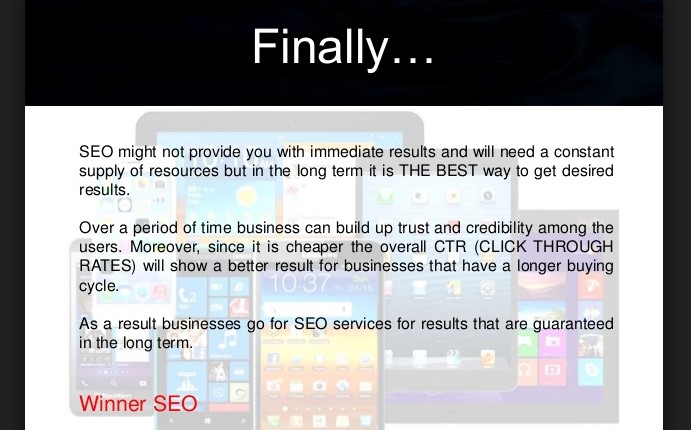
Given below are some circumstances when SEO would prove beneficial for an online business.
- When you want consistent results. SEO has a long gestation period.To get to the first page of search engine results won’t happen overnight or a week. To reach the top of the SERPs will take time. Once your website gets there via SEO, you will enjoy sustained traffic. Again, if you keep up with your SEO campaign, working to maintain and improve results. You can stay on top for a long time and reap long-term benefits.
- When you want to build an authority site. For a particular niche, an authority website is an established resource center. It is the “go to” website when members of that niche need accurate information. An authority site, once it gets going, will be able to generate lots of traffic based on URL recall alone. The best way to establish an authority site. It’s by generating sustainable traffic to your pages. This way building up a reputation until it becomes popular enough to dominate its market. The only way to produce sustainable traffic required is through clever content. It can promote it by smart SEO planning.
- If you want to increase the value of your website. Websites, in other words, are virtual real estates. If you’re planning to sell your website for a premium price, you have to increase its value. Many factors can contribute to increasing its value. Among them are amount of traffic generated, consistency of traffic generated, page rank. Search engine rankings over a period and link popularity. All these come in the ambit of SEO.
You need to know that SEO isn't "Free Clicks." It's a tremendous amount of work in creating and promoting content. Involving lots of time and money.
- SEO vs. SEM the ground reality
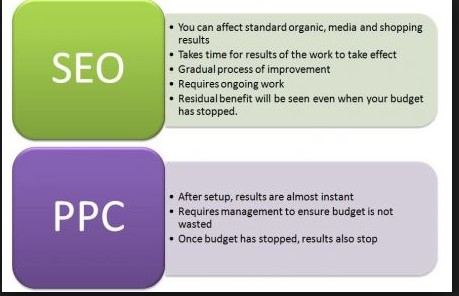
SEO is a long play when it is to do with building and growing your business. If you are looking at quick wins, consider paid advertising.
ROI delivered from paid advertising has a short lifespan. Compared to the potential benefits of SEO and content marketing for an online store.
If you have to choose your distribution channel – i.e. paid versus free. You have to understand the objectives of each of them. It, in turn, will show you the unique challenges of each channel. It helps you craft solid strategies to deal with those challenges. To maintain a proper balance
As each marketing channel has its core objectives and challenges. The best option is to embrace them both.
Organic search and paid search options is the crux of the SEO vs. SEM debate. New software that enter the market on a regular basis can help you track your spending. Both on-site SEO- and SEM-related ads. Many SEO tools and tricks exist. That proponents of both SEO and SEM can use to increase results from search engine campaigns. The focus of all these developments is simple. It is to keep companies at the top of the search results and the sponsored results on major engines.
Smart marketers should promote content among owned, earned and paid media. To begin, use paid advertising to drive visitors to your funnel. Then leverage high-value content they won’t be able to resist.
Earned media is the most respected. Whatever a brand or marketer says is immediately suspect. But trusted third parties are just that – trusted third parties. It makes amplifying an earned media win more valuable. Than a comparable amplification of owned media or straight paid media.
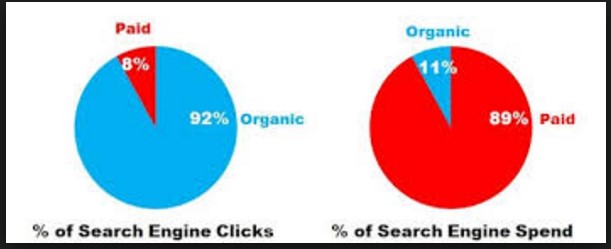
SEMPO, the Search Engine Marketing Professionals Organization. It estimates 87% of search engine dollar spend on PPC vs. 11% dedicated to SEO efforts. Its more than $10 billion spent on PPC vs. just $1 billion devoted to SEO. That means the strategy that's over 5x more efficient. SEO recieves only 1/8 the media spend in the market! Justifying the expense of a PPC campaign is hard. You end up knowing that SEO is more successful and the better long-term value.
The rising cost of Google ads is just another major consideration. On comparing PPC and SEO (particularly for small businesses). Theres plenty written on the increasing cost of PPC. Increasing competition and less “real estate” available, which are the driving factors.
Never fall into the trap thinking that paid ads are good enough to maintain a web presence. <<Add Click to Tweet>>
When the cost of bids for relevant keywords go up. The strategy alone won’t sustain or be profitable.
In that case partner PPC and paid ads with organic search optimization. A consistent social media presence and email campaigns.
All customers don’t experience the internet the same way. Only utilizing one strategy could isolate a large potential customer base and conversions.
One shouldn't be thinking as SEO vs. PPC - but rather that both SEO and PPC are important -- and complementary! <<Add Click to Tweet>>
Parts of an online marketing strategy.
Get the wheel turning with PPC and at the same time invest in SEO. It can speed up short term momentum and build for long term results and increasing ROI.